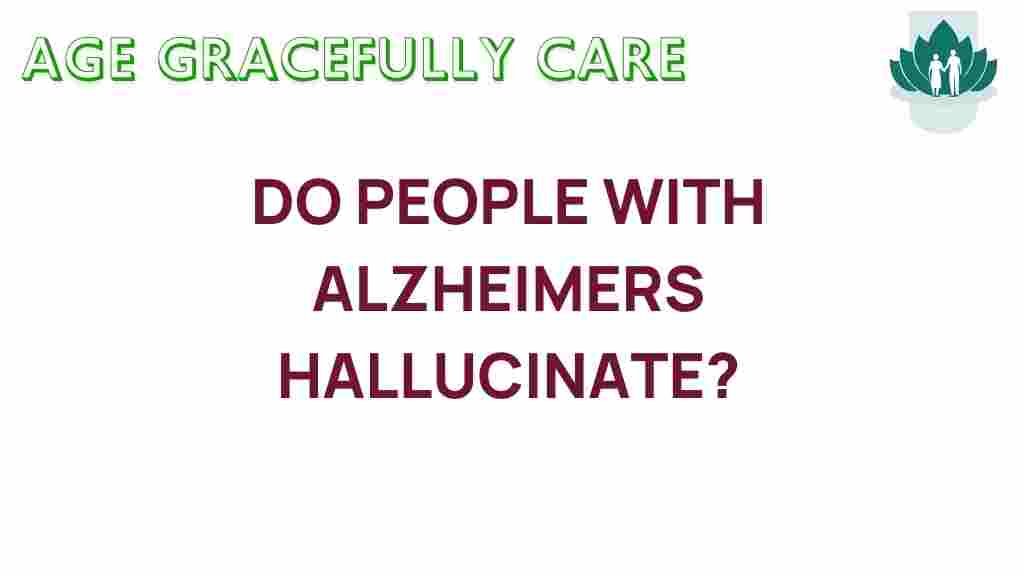Unraveling the Mystery: Do People with Alzheimer’s Hallucinate?
Alzheimer’s disease is a complex and challenging neurodegenerative condition that affects millions of individuals and their families worldwide. As the disease progresses, many patients experience a variety of symptoms, including cognitive decline and changes in behavior. One of the more distressing symptoms that can arise in individuals with Alzheimer’s is hallucinations. This article aims to explore the relationship between Alzheimer’s and hallucinations, shedding light on what caregivers and families can expect during the patient experience.
Understanding Alzheimer’s and Hallucinations
Alzheimer’s is the most common form of dementia, characterized by progressive memory loss, cognitive decline, and behavioral changes. While memory loss is often the most recognized symptom, hallucinations can also occur, particularly in the later stages of the disease. Understanding these phenomena is crucial for effective caregiving and mental health management.
What Are Hallucinations?
Hallucinations are sensory experiences that appear real but are created by the mind. They can affect any of the senses, including:
- Visual Hallucinations: Seeing things that are not present.
- Auditory Hallucinations: Hearing sounds or voices that do not exist.
- Olfactory Hallucinations: Smelling odors that are not there.
- Tactile Hallucinations: Feeling sensations on the skin that aren’t real.
In the context of Alzheimer’s and dementia, hallucinations may stem from the brain’s altered processing and can lead to confusion and distress for both patients and caregivers.
Why Do Hallucinations Occur in Alzheimer’s Patients?
Hallucinations in Alzheimer’s patients can occur due to a variety of reasons:
- Cognitive Decline: As the brain deteriorates, it may misinterpret sensory information.
- Neurological Changes: Changes in brain chemistry and structure can lead to altered perceptions.
- Medications: Some medications used to treat Alzheimer’s or other conditions can cause hallucinations as a side effect.
- Environmental Factors: Changes in surroundings, such as moving to a new home or hospital, can trigger hallucinations.
Common Symptoms of Hallucinations in Alzheimer’s Patients
Recognizing hallucinations in individuals with Alzheimer’s is vital for appropriate intervention. Symptoms may include:
- Disorientation or confusion about the environment.
- Talking to someone who isn’t there.
- Fear or anxiety related to perceived threats or situations.
- Reactions to visual stimuli that others do not see.
Understanding these symptoms is crucial for caregivers to provide the necessary support and reassurance.
Managing Hallucinations in Alzheimer’s Patients
Caregiving for individuals with Alzheimer’s who experience hallucinations can be particularly challenging. Here are some strategies to manage these symptoms effectively:
Step 1: Stay Calm and Reassuring
When a patient experiences hallucinations, it is essential for caregivers to remain calm. Reassure them that they are safe and that you are there to help. Your composure can help soothe their anxiety.
Step 2: Validate Their Experience
Even if what the patient perceives is not real, it is important to validate their feelings. For example, if they see someone who isn’t there, acknowledge their emotions without reinforcing the hallucination:
“I understand that you are seeing someone, and it seems real to you. I am here with you.”
Step 3: Redirect Attention
Distraction can be an effective strategy. Gently redirecting the patient’s attention to another activity—like listening to music, looking at photo albums, or engaging in simple tasks—can help reduce the focus on hallucinations.
Step 4: Create a Calm Environment
Minimize stressors in the environment. A calm and familiar setting can reduce the likelihood of hallucinations occurring. Consider the following:
- Reduce noise levels.
- Maintain consistent lighting to avoid shadows and distortions.
- Keep the surroundings familiar to the patient.
Step 5: Consult with Healthcare Professionals
If hallucinations persist or worsen, it is crucial to consult with a healthcare provider. They can evaluate the patient’s medications and overall health to determine if adjustments are needed. Sometimes, hallucinations may be managed with medication or therapy.
Troubleshooting Tips for Caregivers
Caregiving for someone with Alzheimer’s who experiences hallucinations can be overwhelming. Here are some troubleshooting tips to help navigate this challenging experience:
1. Document the Episodes
Keep a record of when hallucinations occur, their duration, and any potential triggers. This documentation can provide valuable information to healthcare providers.
2. Educate Yourself
Understanding Alzheimer’s and its symptoms can empower caregivers. Knowledge about the disease will help you respond effectively to challenges. Resources such as the Alzheimer’s Association provide helpful information.
3. Seek Support
Connecting with other caregivers or support groups can provide emotional relief and practical advice. Sharing experiences can help you feel less isolated and more equipped to handle the situation.
4. Prioritize Your Mental Health
As a caregiver, your mental health is essential. Ensure you take breaks, practice self-care, and seek counseling if needed. A well-supported caregiver is better equipped to manage the stresses of caregiving.
Conclusion
In conclusion, hallucinations can be a troubling symptom of Alzheimer’s disease, affecting both the patient and their caregivers. Understanding the nature of these hallucinations, recognizing their symptoms, and employing effective management strategies are crucial for improving the patient experience. By staying calm, validating feelings, and creating a supportive environment, caregivers can help alleviate distress. Additionally, consulting healthcare professionals when necessary can ensure proper management of symptoms. Through education, documentation, and support, caregivers can navigate the complexities of Alzheimer’s while maintaining their mental health and well-being.
For more information on Alzheimer’s, hallucinations, and caregiving, you can visit this resource.
This article is in the category Health and created by AgeGracefullyCare Team
